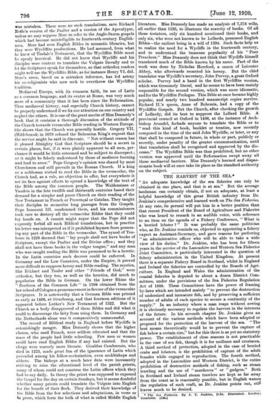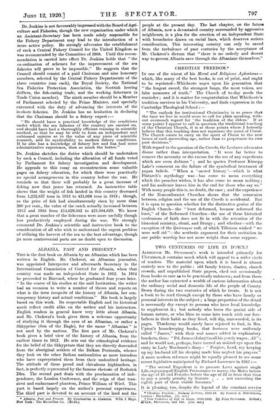THE HARVEST OF THE SEA.*
" Ali adequate knowledge of the sea fisheries can only be obtained in one place, and that is at sea." But the average landsman can certainly obtain, if not an adequate, at least a helpful knowledge of this great British industry from Dr. Jenkins's comprehensive and learned work on The Sea Fisheries. At any rate, its perusal will put him in a better position than that recent President of the Board of Agriculture and Fisheries who was heard to remark in an audible voice, with reference to an item on the agenda of a Fishery Conference, " What is a berried lobster ? " It was probably the same politician who, as Dr. Jenkins reminds us, objected to appointing a fishery expert as Assistant-Secretary, and gave reasons for preferring " an administrative officer who will- be able to take a wide view of his duties." Dr. Jenkins, who has been for fifteen years in the service of the Lancashire and Western Sea Fisheries Joint Committee, is particularly interested in the question of fishery administration in the United Kingdom. At present there is a separate Fishery Board in Scotland, whilst in England and Ireland the fisheries are controlled by the Boards of Agri- culture. In England and Wales the administration of the coastal fisheries is deputed to about a dozen District Com- mittees, under the provisions of the Sea Fisheries Regulation Act of 1888. These Committees have the power of framing by-laws which are intended mainly " to prevent the destruction of undersized and immature Bah, and by preserving a sufficient number of adults of each species to secure a continuity of the supply." In an industry where a man reaps without sowing it is obviously necessary to regulate the harvest in the interests of the future. In his seventh chapter Dr. Jenkins gives an account of the various methods which have been adopted or proposed for the protection of the harvest of the sea. " The best means theoretically would be to prevent the capture of fish below a certain size," but for this there is as yet no statutory power. The establishment of close seasons is not practicable in the case of sea fish, though it is for molluscs and crustacea. A third method of protection, adopted in the case of berried crabs and lobsters, is the prohibition of capture of the adult females while engaged in reproduction. The fourth method, adopted in the Lancashire and Western District, is the entire prohibition of destructive methods of fishing, such as steam trawling and the use of " murderers " or " gadgers." Both in Scotland and Ireland steam trawlers are kept as far away from the coast as is reasonably possible, but in English waters the regulation of such craft, as Dr. Jenkins points out, still leaves much to be desired.
• The Sea Fisheries. By J. T. Jenkins, ILSc. Illustrated. London : Constable. 1244.]
Dr. Jenkins is not favourably impressedwith the Board of Agri- culture and Fisheries, though the new organization under which an Assistant-Secretary has been made solely responsible for the Fishery Department may lead to the introduction of a more active policy. He strongly advocates the establishment of such a Central Fishery Council for the United Kingdom as was recommended by the Committee of 1908. Until this reoom- mendation is carried into effect Dr. Jenkins holds that " the co-ordination of schemes for the improvement of the sea fisheries will prove to be impossible." He suggests that the Council should consist of a paid Chairman and nine honorary members, selected by the Central Fishery Departments of the three countries (one each), the Royal Society, the National Sea Fisheries Protection Association, the Scottish herring drifters, the fish-curing trade, and the working fishermen (a Trade Union member). The ninth member should be a Member of Parliament selected by the Prime Minister, and specially entrusted with the duty of advancing the interests of the in-shore fisheries. Dr. Jenkins has no hesitation in declaring that the Chairman should be a fishery expert :-
" He should have a practical knowledge of the conditions under which the sea fisheries of the country are carried on, and should have had a thoroughly efficient training in scientific method, so that he may be able to form an independent and unbiassed opinion as to the value of any piece of scientific research, and its applicability to modern fishery conditions. If he also has a knowledge of fishery law and has had some administrative experience, then so much the better."
Dr. Jenkins sketches the duties which should be undertaken by such a Council, including the allocation of all funds voted by Parliament for fishery investigation and development. He appends to this essay on reconstruction some valuable pages on fishery education, for which there were practically no special arrangements in this country before the war. He reminds us that there will probably be a great increase of fishing now that peace has returned. An instructive table shows that the weight of fish landed in this country decreased from 1,232,837 tons in 1913 to 431,096 tons in 1918 ; though, as the price of fish had simultaneously risen by more than 300 per cent., the value of the catch actually increased between 1913 and 1918 from £14,629,342 to £21,094,629. We know that a great number of the fishermen were more usefully though less productively employed during the war. We strongly commend Dr. Jenkins's scientific and instructive book to the consideration of all who wish to understand the urgent problem of utilizing the harvest of the sea to the best advantage, though its more controversial parts are no doubt open to discussion.







































 Previous page
Previous page